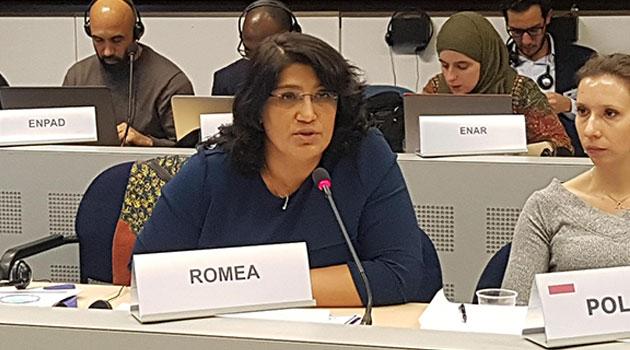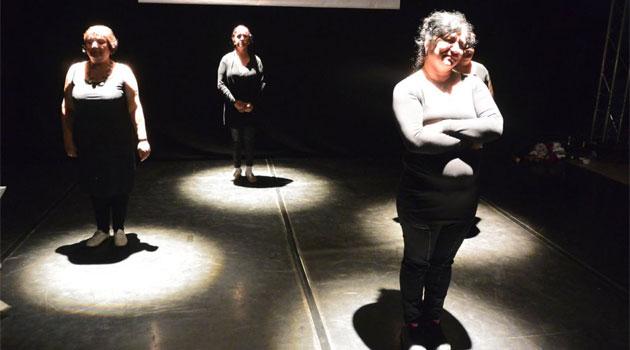EU High Level Group on combating racism features Roma participants from Czech Republic, discusses Afrophobia

On 5 December 2017 the European Union High Level Group on combating racism, xenophobia and other forms of intolerance convened and discussed the specific racism faced by people of African descent in the European Union. The topic is a big step towards recognizing the prevalence of Afrophobia in Europe and then acting to combat it.
The High-Level Group was established last year for the purpose of preventing hate crime and hate speech. Black people in Europe are particularly exposed to racist violence and hate speech.
The EU Fundamental Rights Agency’s second survey on minorities is being released today (live broadcast online here) and highlights that a significant proportion of Black people feel discriminated against because of their ethnicity or skin color and have experienced hate-motivated harassment or violence. Black women are also vulnerable to discrimination at the intersection of gender and race.
“This discussion is an important first step to end the current state of denial when it comes to Afrophobia in Europe,” Jallow Momodou, a representative of the European Network Against Racism (ENAR), said about yesterday’s meeting. “Much more needs to be done to tackle the structural racism that prevents Black people from being included in European society.”
The EU has not yet officially marked the United Nations International Decade for People of African Descent (2015-2024). This Decade would be an opportunity for EU Member States to commit to action towards equal rights for people of African descent in their respective countries.
The High Level Group meeting was held on the eve of the children’s celebration of Saint Nicholas, which is important in many EU countries. Unfortunately, the persistence of discriminatory stereotypes in this tradition in some countries, including the use of blackface, negatively impacts children and perpetuates deeply-rooted stereotypes about Black people that can exacerbate discrimination and lead to violence.
Romani representatives from the Czech Republic also addressed the meeting. News server Romea.cz presents the remarks of Monika Mihaličková below.
The High Level Group is a platform for supporting EU and Member State efforts to ensure effective implementation of policies and rules on combating hate crime and hate speech. The Group fosters thematic discussions about challenges in this area.
One sub-group of the platform focuses on countering hate speech online, including by means of the Code of Conduct on countering illegal hate speech online that was agreed upon between the European Commission and Facebook, Microsoft, Twitterand YouTube in May 2016. The other sub-group focuses on improving methodologies for collecting data on hate crime through expert discussions supervised by the EU Agency for Fundamental Rights (FRA).
Remarks by Monika Mihaličková to the High Level Group
As a former MP from the Czech Republic I am focused on the search for an effective policy toward decreasing ethnic tensions in my country and improving the prospects of social cohesion and the mobility of Roma children in the education system, and we are having successes. From the point of promoting the educational mobility of Roma kids, the ROMEA organization’s Roma Scholarship Program financially supports 86 secondary school students, as well as 50 university level students on behalf of the Roma Education Fund this year, and we plan to expand the program substantially for the 2018-2020 period with the help of private and corporate donors.
Currently, we run a public fundraising drive on behalf of one elementary school recently attacked by racist haters on social media. This fall a Czech media outlet published the class photos of all first-graders in the country in its local editions, and the photo of one first-grade class sparked a negative reaction because the children were of Arab, Roma or Vietnamese origin. Racist Facebook users called for the children to be killed, to be sent to the gas, to be bombed. On top of that, a newly-elected MP said she understands such a reactions when people see pictures like that… Well, what is there to say? We let extremists into our Parliament and now we have to balance it and protect those who are under attack by political populists.
ROMEA responded by fundraising for the school as a gesture of moral support. We started to run a campaign, together with the respected sociologist Mr Ivan Gabal. The campaign is named “THEY WANT TO GAS THEM, WE WANT TO SEND THEM TO SCHOOL!”
Let’s all say “NO!” loud and clear to hatred by supporting the Romani Scholarship Program. We will donate 50 % of our current fundraising effort to all of the children, irrespective of nationality, attending the Primary School in Teplice that has been recently attacked online. Our drive has raised more than 20 thousand euro and attracted financial support from more than 1 000 donors. We are gaining and increasing public support for the education strategy as a response to the racist calls for these children to be killed, including from Romani donors. We are proud that this campaign is enjoying a great deal of success. It will run until the end of the year and is a constructive way for those who are disturbed by such hatred to demonstrate their solidarity with those who are marginalized by it.
The ROMEA organization is one of the most significant Roma NGOs in terms of raising public awareness and an important actor in interethnic news and communications. For 15 years it has run the Romea.cz online news server and the Romano voďi monthly. We assist our fellow journalists, those who work ethically, with contacts and context about the Romani world. We work as a media watchdog, reporting disinformation and insisting on corrections and retractions of reporting that is biased, false, and misleading, and we have exposed many Czech journalistic hoaxes. ROMEA also records the oral histories of Roma in our Roma Memory project, which involves the cooperation of the Museum of Romani Culture and Charles University. We train Romani journalists as part of our education work. We empower interest in solutions from both sides of these interethnic relations in Czech society and cooperation among interested communities and organisations like the Federation of Jewish Communities, other NGOs, the Václav Havel Library, the Open Society Foundations and others.
This year ROMEA drafted the antigypsyism section of the Roma Civil Monitor project for the Czech Republic. This research project, funded by DG Justice and coordinated by Central European University in Budapest, will deliver civil society findings from almost all of the EU Member States about the Roma community experience, including the experience of antigypsyism, to policy makers and public authorities so that interventions in this area can be constantly improved on the basis of evidence and facts.
Our understanding of the situation is that a major threat is coming from an increasingly nationalized politics introducing racism and intolerance into domestic and recently even into parliamentary politics – the ultra-right recently entered the Czech lower house and may become part of the governing coalition. Consequently, we are witnessing the significant decline of the pro-EU vote and pro-EU political parties. Their number of seats is currently in the minority. We have to recognise the proven link between support for racism, nationalism and extremism on the one hand and the rise of Euroscepticism and radical anti-EU rhetoric on the other.
This is where our common interest is being born and becoming interconnected. From the point of view of policy development, as far as active, positive responses, we see the following principles as the most important:
A/ The domestic origins of this racism and neo-Nazism necessitates a search for domestic solutions and policies. The EU can help support this with funding, but cannot replace domestic governments. That is our task, and we will do it with all our commitment and effort.
B/ There is a consensus among the broader NGO community in the Czech Republic that the rise of intolerance, racism and hatred has been capitalised on by domestic parliamentary politicians to become a common feature of all the V4 countries and has become a specific regional aspect of our four nations. This is where serious business begins for the EU. The commonality of our problem with extremism does not mean there will be common ways to resolve it, but there is something similar to all these countries, and that is our increasingly short, insufficient historical memory. Our second common problem is with the failed transition of our educational systems toward open, western, multicultural, multilingual schools.
C/ In the debate over EU support for the modernization and further openness of Central European societies we need to talk about support for historical and cultural education employing instruments like the arts, film, and sports, going back to our history and empowering new, open identities as well. Historical awareness and positive emotions replacing fears and hate will bring us to a new, open feeling of commonality rather than one of inferiority and inequality among our societies of the “old” and “new” Member States. I warn here that this should not be propaganda, as propaganda will backfire.
D/ Educational systems are on the Member States agendas, but exchanges of students and scientific programmes are not enough. We need more extensive modernization of our educational systems and the EU has to assist with this. For example, there should be exchanges of teachers, trainings of Czech teachers and school administrations through internships, the introduction of mentoring in the schools, best practices transfer, employment of ICT in teaching, etc.
Let me conclude my presentation with the expression of my personal feeling about time as a resource. It is extremely scarce and time is not working on our side, at this moment at least.
Monika Mihaličková,ROMEA, o.p.s.
